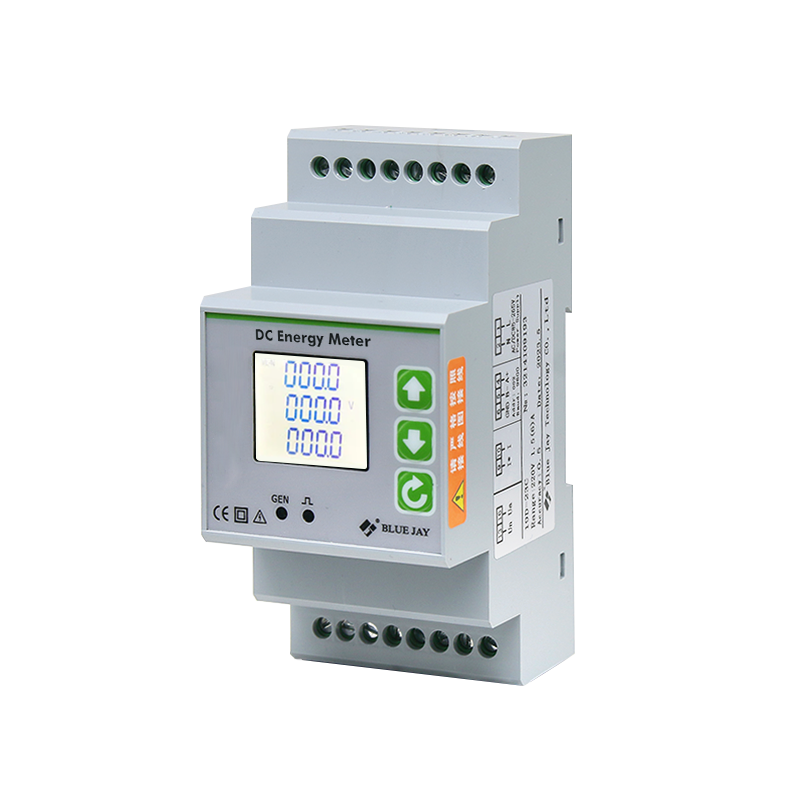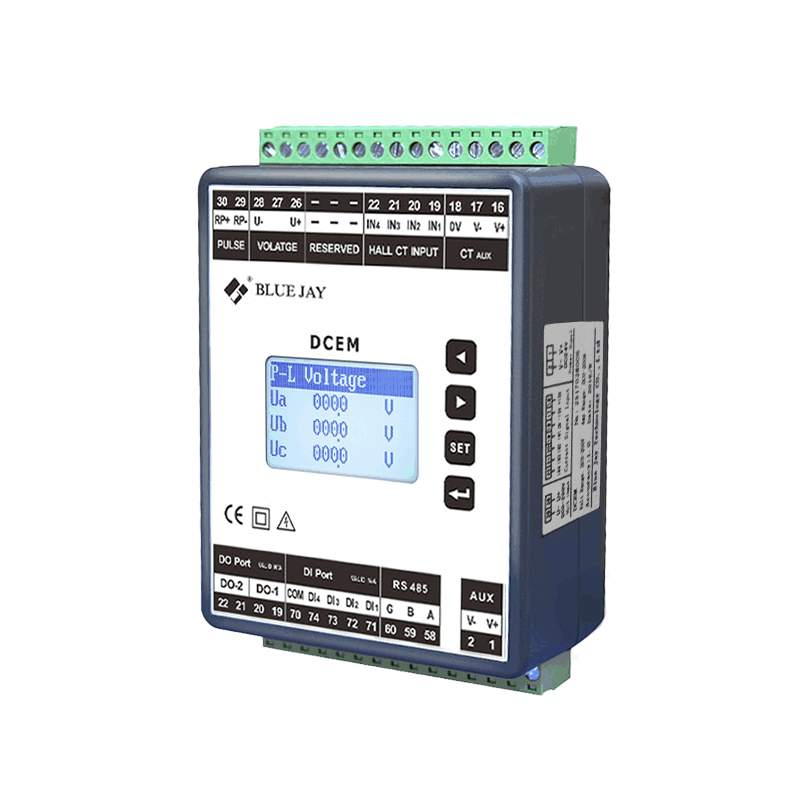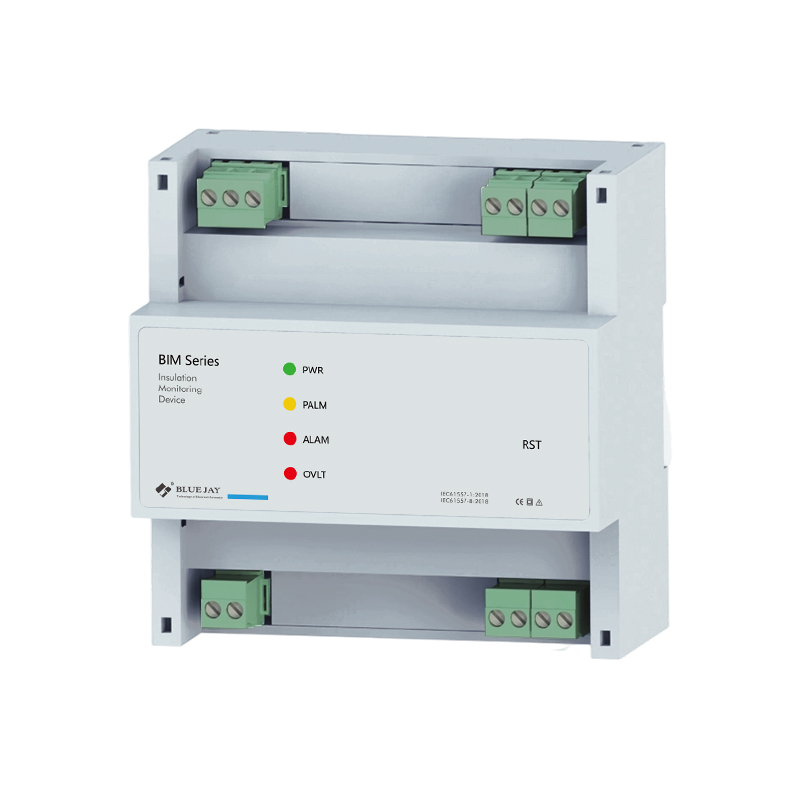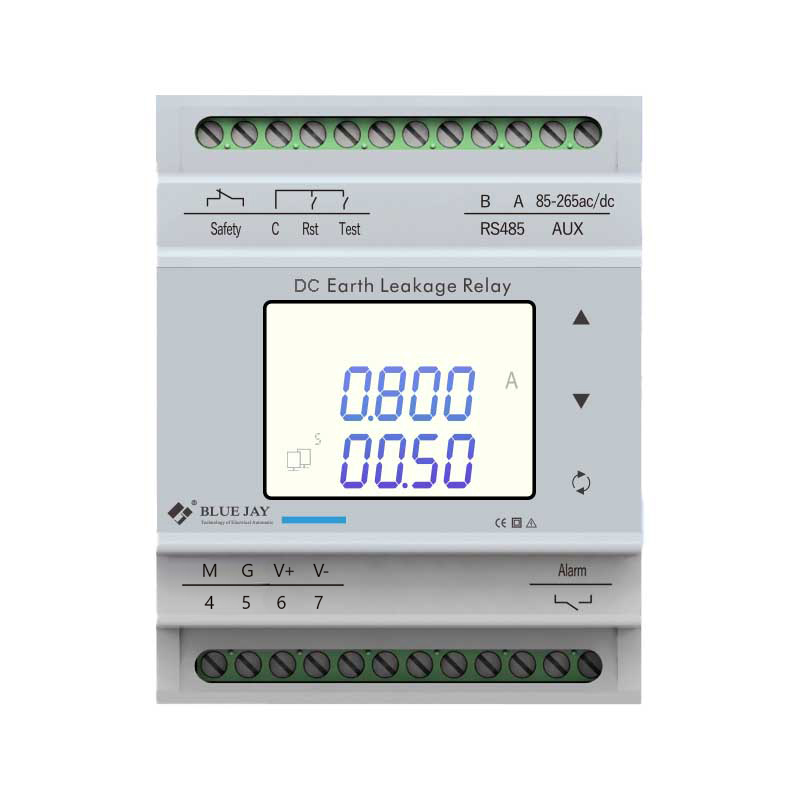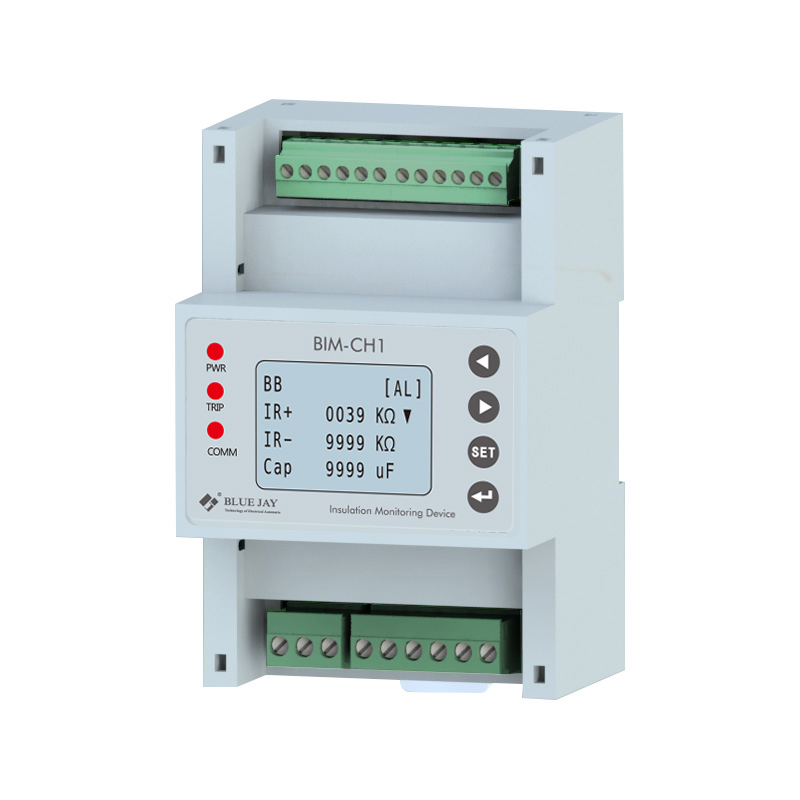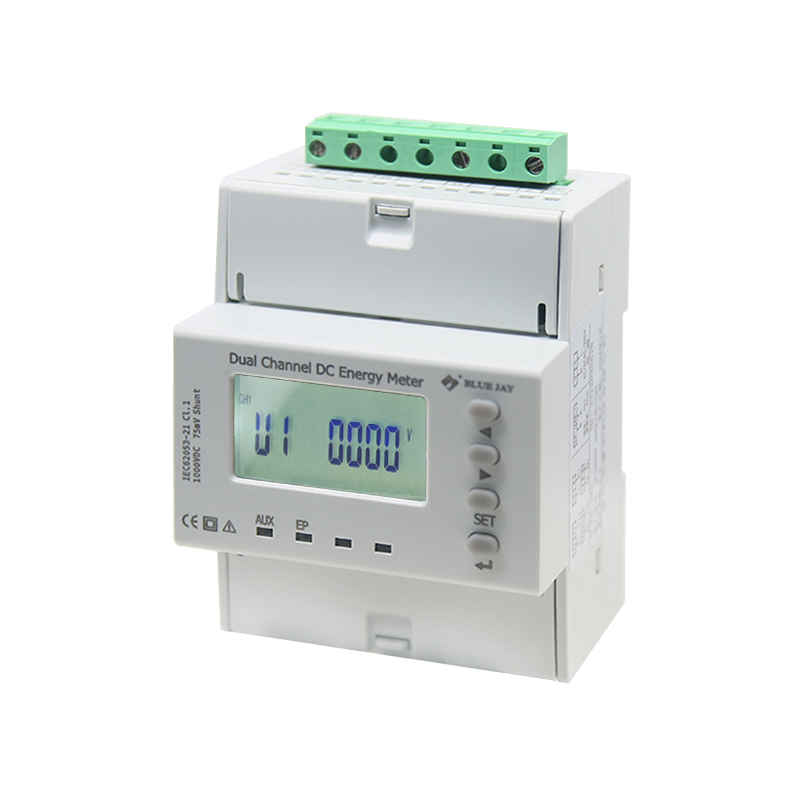
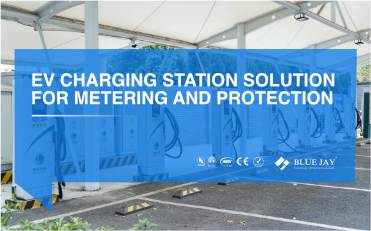
EV Charging Station Solution for Metering and Protection
By bluejay | Company News
Blue Jay’s EV charging station solutions for metering and protection can be widely used in a wide range of applications, including residential, commercial, public, and fleet charging sites. This article will introduce the EV charging station solution, from basic EV charging station knowledge and metering/protection solutions for EV charging stations.
Basic Knowledge of EV charging stations
Two different types of EV charging stations

Currently, there are two primary types of charging stations on the market: AC and DC charging stations. The main differences between DC and AC charging piles lie in power output and charging speed.
AC charging stations are low-current charging stations that primarily provide AC power to the electric vehicle’s onboard charger. They are primarily suitable for small passenger electric vehicles and are primarily used in residential applications, as well as fleets, multi-family buildings, shopping malls, offices, and other commercial spaces.
DC charging stations are high-power charging stations that convert AC power from the grid into DC power for charging EV batteries. They can be categorized as DC fast chargers (high-power) and DC wallboxes (also known as DC target chargers, which are lower-power and intended for home and office use). There are currently three types of DC fast chargers: Combined Charging System (CCS), CHAdeMO (“CHArge de MOve”), and Tesla Superchargers, each with a different charging port connector. DC EV charging stations are primarily used in public and workplace settings for fast charging of electric buses, taxis, and other vehicles.
Common Components for EV Charging Piles
In EV charging piles, the common components include an energy meter, circuit breaker (MCCB, MCCB, RCCB), earth leakage relay, insulation monitoring device IMD, Current Transformer, DC shunt, AC/DC contactor, AC/DC converter, fuse, AC/DC power supply, Charging Pile Controller, terminal blocks, SPD, etc.

Metering and protection design requirements for EV charging stations
Compact and reliable metering and protection are crucial for the control systems of both AC and DC charging stations.
For charging pile metering, high accuracy, multi-tariff, and time-of-use metering, as well as remote communication, are key design features.
For charging pile protection, residual current and insulation fault detection equipment must be installed within the charging pile to ensure the electrical safety of both personnel and the charging pile.
Metering and protection for Electric Vehicle Charging Stations
When traditional demand charges (i.e., electricity surcharges based on peak electricity usage) are imposed on high-capacity, low-utilization EV charging stations, they impose a disproportionate cost burden on station owners. Furthermore, converting the voltage from utility AC to station DC can introduce power quality issues. Therefore, energy metering, particularly DC energy meters, has become an integral component of charging stations. They accurately bill the kWh consumed during charging and monitor power quality, ensuring correct billing and safe use.
When it comes to charging station protection, insulation monitoring devices, and earth leakage protection relays are crucial. They primarily control and monitor insulation faults and leakage current in the DC line to ensure safe charging.
Other protective devices required within EV charging piles include AC/DC power conversion modules (for example, a 30-40 kW charging pile can integrate 6-10 power modules), AC/DC contactors (for controlling the on/off switching of the charging circuit), charge controllers, leakage protectors (to prevent residual operating currents > 30mA), DC residual current protectors (to prevent residual currents > 6mA), and current transformers (to measure output current and detect leakage).
Blue’s line of metering and protection relays includes AC energy meters, DC energy meters, Insulation monitoring relays, earth leakage relays, current transformers, etc. We can also provide other EV charging station components like AC/DC contactor, EV Power module, etc.
Blue Jay Metering and protection for AC Charging Station

In AC EV charging stations, single phase power meter, three phase AC power meter, AC contactors, MCB, and MCCB can be used. The following is the simple wiring diagram between these metering and protection products.
Blue Jay Metering and protection for DC charging Station

In DC EV Charging Stations, we can provide dual-channel DC power meter, panel-mounted DC power meter, DC insulation monitoring device, DC earth leakage relay, DC contactor, Hall current transformer, Inverter, MCB, and MCCB.
Applications of Blue Jay EV Charging Pile Products
Our products are suitable for all types of EV chargers as follows:
- Single phase AC EV Charging Stations
- three phase AC EV Charging Station
- 3.5kW AC EV Charging Station
- 7kW AC EV Charging Station
- 15kW AC EV Charging Station
- DC EV Charging Station 60KW, 90KW, 120KW, 150KW, 180KW, 360KW DC fast charger
- Dual EV Charger
Related Arcitles

Basic Knowledge of EV Charger Metering
Table of Contents How can electric vehicle charging station

DC energy meter for EV charger – Applications and Advantages
The DC energy meter for EV charger is a

Insulation Monitoring for DC Charging Stations
Insulation monitor is widely used in DC Charging Stations, DC
Tags
Company News
Blue Jay’s EV charging station solutions for metering and protection can be widely used in a wide range of applications, including residential, commercial, public, and fleet charging sites. This article will introduce the EV charging station solution, from basic EV charging station knowledge and metering/protection solutions for EV charging stations.
Basic Knowledge of EV charging stations
Two different types of EV charging stations
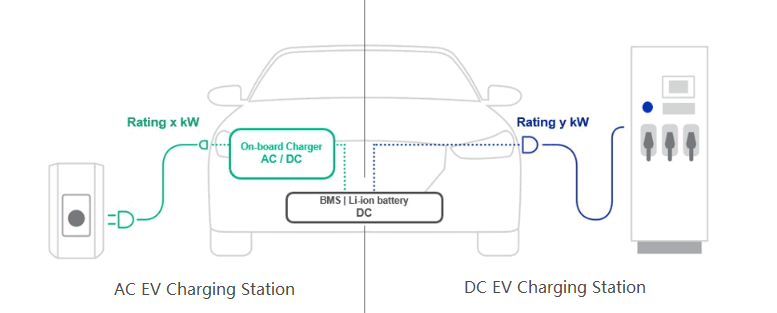
Currently, there are two primary types of charging stations on the market: AC and DC charging stations. The main differences between DC and AC charging piles lie in power output and charging speed.
AC charging stations are low-current charging stations that primarily provide AC power to the electric vehicle’s onboard charger. They are primarily suitable for small passenger electric vehicles and are primarily used in residential applications, as well as fleets, multi-family buildings, shopping malls, offices, and other commercial spaces.
DC charging stations are high-power charging stations that convert AC power from the grid into DC power for charging EV batteries. They can be categorized as DC fast chargers (high-power) and DC wallboxes (also known as DC target chargers, which are lower-power and intended for home and office use). There are currently three types of DC fast chargers: Combined Charging System (CCS), CHAdeMO (“CHArge de MOve”), and Tesla Superchargers, each with a different charging port connector. DC EV charging stations are primarily used in public and workplace settings for fast charging of electric buses, taxis, and other vehicles.
Common Components for EV Charging Piles
In EV charging piles, the common components include an energy meter, circuit breaker (MCCB, MCCB, RCCB), earth leakage relay, insulation monitoring device IMD, Current Transformer, DC shunt, AC/DC contactor, AC/DC converter, fuse, AC/DC power supply, Charging Pile Controller, terminal blocks, SPD, etc.
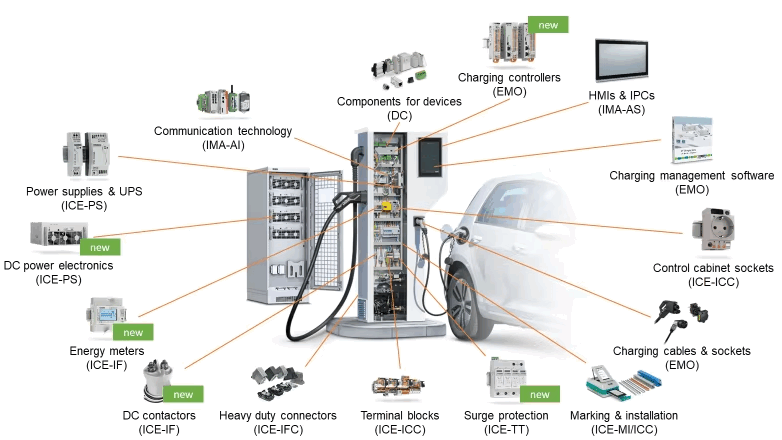
Metering and protection design requirements for EV charging stations
Compact and reliable metering and protection are crucial for the control systems of both AC and DC charging stations.
For charging pile metering, high accuracy, multi-tariff, and time-of-use metering, as well as remote communication, are key design features.
For charging pile protection, residual current and insulation fault detection equipment must be installed within the charging pile to ensure the electrical safety of both personnel and the charging pile.
Metering and protection for Electric Vehicle Charging Stations
When traditional demand charges (i.e., electricity surcharges based on peak electricity usage) are imposed on high-capacity, low-utilization EV charging stations, they impose a disproportionate cost burden on station owners. Furthermore, converting the voltage from utility AC to station DC can introduce power quality issues. Therefore, energy metering, particularly DC energy meters, has become an integral component of charging stations. They accurately bill the kWh consumed during charging and monitor power quality, ensuring correct billing and safe use.
When it comes to charging station protection, insulation monitoring devices, and earth leakage protection relays are crucial. They primarily control and monitor insulation faults and leakage current in the DC line to ensure safe charging.
Other protective devices required within EV charging piles include AC/DC power conversion modules (for example, a 30-40 kW charging pile can integrate 6-10 power modules), AC/DC contactors (for controlling the on/off switching of the charging circuit), charge controllers, leakage protectors (to prevent residual operating currents > 30mA), DC residual current protectors (to prevent residual currents > 6mA), and current transformers (to measure output current and detect leakage).
Blue’s line of metering and protection relays includes AC energy meters, DC energy meters, Insulation monitoring relays, earth leakage relays, current transformers, etc. We can also provide other EV charging station components like AC/DC contactor, EV Power module, etc.
Blue Jay Metering and protection for AC Charging Station
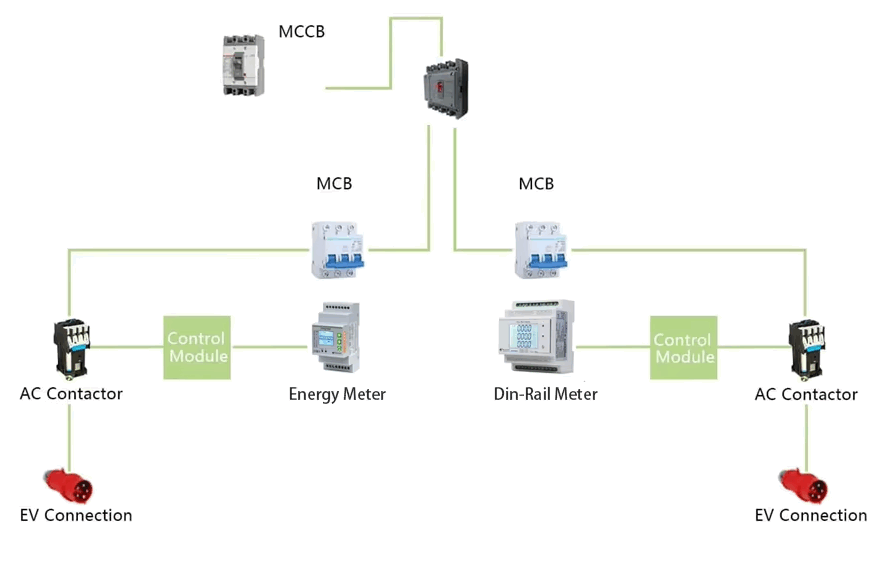
In AC EV charging stations, single phase power meter, three phase AC power meter, AC contactors, MCB, and MCCB can be used. The following is the simple wiring diagram between these metering and protection products.
Blue Jay Metering and protection for DC charging Station
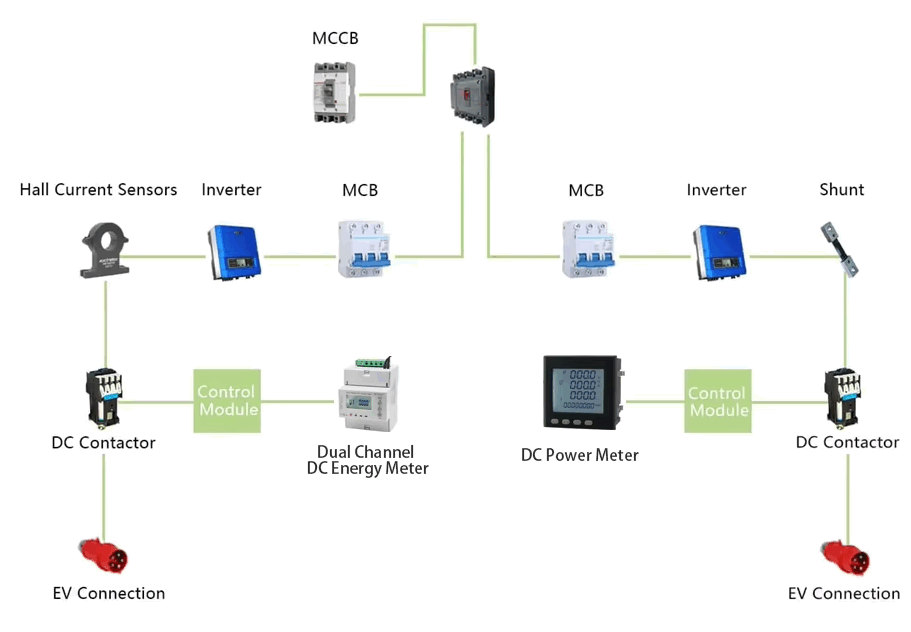
In DC EV Charging Stations, we can provide dual-channel DC power meter, panel-mounted DC power meter, DC insulation monitoring device, DC earth leakage relay, DC contactor, Hall current transformer, Inverter, MCB, and MCCB.
Applications of Blue Jay EV Charging Pile Products
Our products are suitable for all types of EV chargers as follows:
- Single phase AC EV Charging Stations
- three phase AC EV Charging Station
- 3.5kW AC EV Charging Station
- 7kW AC EV Charging Station
- 15kW AC EV Charging Station
- DC EV Charging Station 60KW, 90KW, 120KW, 150KW, 180KW, 360KW DC fast charger
- Dual EV Charger
Related Arcitles
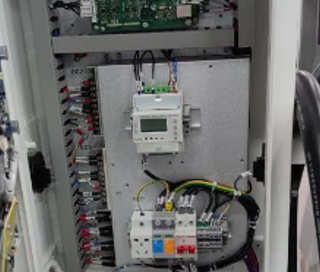
Basic Knowledge of EV Charger Metering
Table of Contents How can electric vehicle charging station

DC energy meter for EV charger – Applications and Advantages
The DC energy meter for EV charger is a
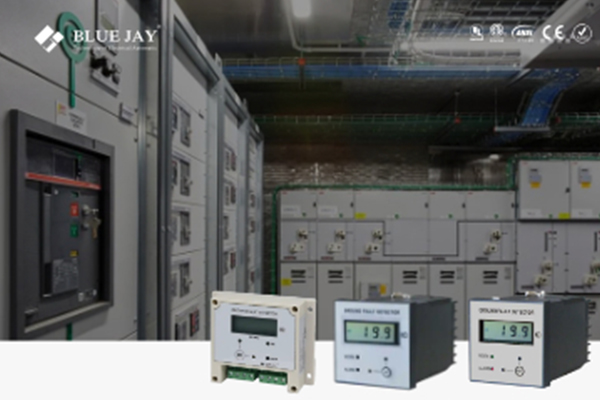
Insulation Monitoring for DC Charging Stations
Insulation monitor is widely used in DC Charging Stations, DC

